Town – everyone came to town today! John is back from America and Lisa had a visitor from America and Joe showed up! It was great. I also got to talk to my sis and her bf on Skype again! Thanks sis for making such an extraordinary effort! After lunch John and I discussed a program called “Choices” presented to low-income schools in America. We are going to tweak the program a bit and conduct workshops with class 7 and 8 here in Fiji. It is a program that strives to teach young adults about why they should stay in school and get a higher education and how many more opportunities they will receive with a high school diploma or university. We are planning to launch in early March and IHRDP already said they would help fund the program! Yay! Things are coming together!
Friday, January 15, 2010
Tomorrow I am going to Suva! Yes! Marica came to my house this afternoon to see if I wanted to do something. Of course! I have been pretty bored lately! So, we decided to walk to a settlement. It was low tide so we walked along the beach. I was remembering these crabs that we saw when I came for my site visit in July and I have not seen them since I have been living in the village. They were a little smaller than a fist and when they pulled in their claws they looked like a perfectly camouflaged rock. No one eats them so maybe they are a seasonal animal and they will come around again in May or so??? I am pretty devastated about it because they were the neatest little buggers.
At the settlement we visited the boys who are busy building a new house. Only two out of seven were working, so we headed over to visit Sisi, the kindergarten teacher. She was so rambunctious today! She was running around laughing like she had a new love in her life. She had just cooked some dhal soup and fried up some fish and invited us for lunch. Oh my goodness. Some people can really cook! She made dhal soup, but added pumpkin, pumpkin leaves, eggplant, tomatoes, and some amazing natural herbs. She also had breadfruit and cassava prepared. It was an amazing lunch out in the middle of remote island Fiji. What a good life!
After returning back to the house I cleaned up, packed my bags, ate some hashbrowns and an apple with peanut butter and raisins (thought of my sis), and headed to bed.
Saturday, January 16, 2010
Suva here I come! Hopped on the boat at 7:15 AM, got dropped off at the road, and caught the brand new “charter” bus to Suva! I had an entire three seater to myself! It was heaven! The weather was perfect, I had a new National Geographic to read, and I was on my way to a hamburger!

Boat dock in Suva
Upon arrival in Suva I ran several errands including getting a poster laminated for my bure. It is a really neat poster that has different trash items shaped like sea creatures and describes why the trash is harmful to the animals and how long it takes for the trash to decompose. I love it! I also found a really cute sulu at the flea market for 5 F$! Good purchase!
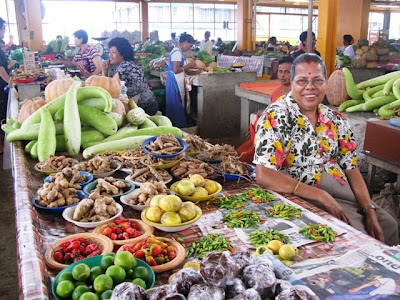
Suva market... Mom you would LOVE it!

After shopping I asked my counterpart who is going with me to training this week if I could come to his house and meet his family. Of course they would love to have me! Who wouldn’t… lol. He came into the city to pick me up (by bus) and we headed over to his house. I had brought his mom a bouquet of flowers, the American way, but what I missed was the Fijian tradition of bringing yaqona. Ooops. My issue with yaqona is that I don’t drink it, it tastes like dirt, the Fijians spend way too much time and money sitting around drinking just to get tired, it causes them to smoke more, and it keeps me up at night until four in the morning when they are singing at the top of their lungs in the village. Although, I was definitely in the wrong by not bringing any to a house that I had never visited. I just thought, because the house was in the city they go by city rules. I was wrong, but it turned out not to be a big deal. They had plenty to last from 5 PM to 2 AM. Of course I ended up sitting there almost the entire time just trying to figure out what they were saying in Fijian and avoiding the smoke if at all possible.

I played cards, watched a Philipino soap opera, and spoke to one of his brothers about registering the village and what ancient laws still stand based on traditional tribal lands. He had documentation printed from a book written in 1869 by an English man. I am assuming Fiji did not know how to read or write in these times and so an Englishman had to write their laws for them. Almost every Fijian word was spelled wrong. Lol. I also walked with one of the cousins over to the University of the South Pacific and we got ice cream at McDonalds. Overall good visit, but it made me miss my family!
Sunday, January 17, 2010

A Fijian hair salon.
I ended up staying the night. In the morning I went for a walk with two of the brothers around the neighborhood. In Fiji there is low income government house right up next to Fijian level mansions and then you walk into a village, with nothing separating these areas. It was so bizarre to see women and children running around dirty, to others getting in their nice SUVs and leaving their gated home, to the “ghetto” where boys are seen playing touch rugby in the middle of the compound. I am glad I explored the neighborhood.
When we got back to the house I realized it was really close to time for Avatar in 3D to start at the movie theater so I invited my counterpart to go to see it with me. We both felt really silly wearing the glasses, but the movie was probably a better experience in 3D than regular, so I am glad we got to go! It really reminded me of one of my favorite cartoon movies as a child, “Fern Gully”. The only thing missing was Batty. I am almost positive they got the idea for Avatar. After the movie we got pizza from Pizza Hut! It was his first time to have pizza from a restaurant! Pizza Hut of Fiji is delicious, but that may be because I have lowered my standards a bit. I am really glad I treated him to pizza and a 3D movie! Fun!

The gang.
Back at his family’s house I took a nap on the porch, then packed up to meet up with the volunteers in Suva. Around dark I arrived at a married couple’s house where we relaxed and told stories reliving our past few months. I love catching up! Everyone is doing well and really enjoying Fiji as far as I can tell. We still have 4 months before the newbies get here, but we are really looking forward to the new group! Although, sad that certain people from the group before us will be leaving in July.
Monday, January 18, 2010
Today was a total work day. I have to get registered to teach (or really just to be in the classroom) through the Fiji government, which involves a very complicated process. I had to do a character check, police clearance, health check, proof of identification, pay processing fees, get passport pictures, have headmasters sign the application and fill out a needs report, as well as turn it into the correct house in Suva. All in all I had great directions from a Peace Corps volunteer so it made the process much smoother than if I had no directions. I also had to speak with Bob and Sai at IHRDP. When I stopped by in the morning they were making final decisions on whether or not they would select my proposal. Within ten minutes they were discussing bringing in the Virgin Coconut Oil trainer to set up a week for her to visit the village. Later in the afternoon I met back up with them and the trainer and we decided on a time frame and an execution plan. It is really going to happen!!! They are going to assist in getting machines, VCO training process, business technicalities, supplies, labels, and the market. I really hope everything comes together the way they have described it to me. I am so excited and cannot wait to bring the message back to the village!
In the evening I met up with most of the Suva volunteers and others in town for a beer at Mad Dogs. It was more catching up time as most of the “others” were from Vanua Levu and I had not seen them since moving to site in July. Several of us ended up eating dinner together at Maya Daba, the best Northern Indian food around. I mean, I do not like Indian food, but I can never pass up a meal at this place! Mmmm. After dinner we split and went back to our hosts’ houses.
Tuesday, January 19, 2010
Today I finished up my teacher registration forms, got work done in the Peace Corps office, and headed to the only museum in Fiji. I really enjoy being counted as a local in Fiji. The entrance fee was only 2.20 F$. After touring all of the old canoes and bamboo rafts I headed into the ice cold gift shop. Soon the doors opened up into a nice museum of old artifacts and detailed descriptions of Fijian history. I would like to list a few of the things that I found to be of importance:
The traditional use of yaqona and the arrival of the grog bowl into Fiji

The arrival of tobacco in Fiji, although, they may have been smoking Fijian tobacco before the Europeans brought it in the 1850s.

This is a killing stone from Namosi. It was used to kill victims captured from war. The victim’s head would be put on top of the stone then bashed with a club, mashing the skull and often decapitating the victim.

I taube lubeniwai – A necklace made from whale’s teeth, stained with kura scrapings and lime. Enemies or commoners were thrown alive into holes dug for house posts as part of an old belief to strengthen and uphold the foundation of the house. This necklace was hung on a house post to keep the human sacrifice quiet.
There are three prominent religions in the Indian culture here in Fiji:
Islam
Muslims believe that Muhammed was the last in a line of prophets beginning with Adam and including Moses and Jesus. Prophet Muhammed brought the message of God to the people in a pure and uncorrupted form. This message was revealed in the form of the Holy Quran and is supported by the Hadith, which are the records describing Prophet Muhammed’s actions and words, thereby providing guidance for a purposeful life for all followers.
The three fundamental Islamic beliefs are in Tawhid, the oneness of Allah; Risalah, prophethood; Akhirah, life after death.
The basis of Islam is total obedience to God. There are five pillars of Islam:
Shahada – the profession of faith and belief in the oneness of God or Allah and the prophethood of Muhammed
Salat – the prescribed daily prayers
Zakat – welfare contribution to the needy
Sawm – fasting during the Islamic month of Ramadan
Haki – the pilgrimage to Mecca
Islam Celebrations
For Muslims, the most importance time of year is Ramadan, a 30 day dawn-to-dusk fast. It was during this month that the prophet Muhammed received his revelation from Allah. Ramadan starts around December or January.
Id-ul-fitr celebrates the end of Ramadan. Special dishes are prepared and alms are given to the poor and presents to the children.
Id-ul-adha commemorates the devotion of Prophet Abraham. Sacrificial meat is shared among the relative, neighbors and poor.
Milad-un-nabi commemorates the birth anniversary of Prophet Muhammed.
Islam in Fiji
The indenture system brought many Muslims from India to work in Fiji. The early immigrants joined together to preserve their religious interest and welfare and formed the Muslin League in 1926 as a national umbrella organization for Muslim interests and the various Muslim groups.
Hindu
The Hindu religion originated in the Indus Valley 2500-1800 BC. Life is perceived as a cycle of life, death, and rebirth – samsara, in which all deeds were repaid in kind karma.
The four main aims of life are:
dharma – right living leading to religious merit and higher rebirth
artha – wealth acquired in an honest way
kama – satisfying legitimate desires
moksha – liberation from the cycle of rebirth through merging with the Brahman (supreme soul)
Hindus pray at home inviting pundit (priests) to conduct puja (religious rites) for them.
The Hindu religion is polytheistic, a belief in many deities. The gods Vishnu and Shiva are of particular importance. Vishnu took human form to enlighten civilization during times of moral decline. The most important of the incarnations are Rama and Krishna, about whom the great literary epics Ramayana and Mahabharata were written.
Hindu Celebrations
Navratri occurs every six months and is celebrated for nine days and nights.
Diwali, the festival of lights, is an end of the year celebration during which prayers are offered to Lakshmi, the goddess of wealth. While the festival signifies many things, the most popular describes the return of victorious Rama from killing Ravana. Additionally, all household lamps are lit to celebrate the return of the sun which a water spirit had hidden during the (Indian) rainy season. Diwali, usually in October or November, is a national festival and holiday in Fiji.
Holi, held in March, celebrates the exploits of Krishna, with the throwing of water and colored dyes. Janmashtami, the anniversary of Krishna’s birth occurs in August or September.
Hinduism in Fiji
The caste system in India divides the Hindu society into classes based on hereditary occupations and rank. It has become meaningless in Fiji although many customs and taboos persist, and orthodox is apparent. Many people still prefer to marry within their caste.
The religious organization of Arya Samaj (Sanskrit for noble persons) was formed in India in 1875 for the revival of the vedic religion based on the ancient sacred writings of Hinduism. The society was formed in Fiji in 1904 and now all of its thirteen branches come under the Arya Prathinidha Sabha in Fiji.
The other major Hindu group in Fiji is the Sanatana Dharma (Sanskrit for Eternal Religion).
The Hindu Society was established in 1976 as an affiliation of many different Hindu organizations, including the Arya Samaj and followers of Sanatana Dharma.
Sikh
Sikhism, an offshoot of Hinduism, is an eclectic monotheistic religion. Sikhs have their own temples, gurdwaras, where they carry out prayer meetings and read their holy book, the Granth Sahib.
The Sikh religion was founded by Guru Nankdeva during the period of religious revival in the early 15th century. He emphasized the fundamental truth underlying all religions. The religion is non-sectarian and promotes harmony with secular life. It is a religion that is not based on image worship but bestows ultimate reverence on the sacred book. Sikhism is a conduct-based religion.
There were ten gurus who succeeded Guru Nanak, the last being Guru Gobind Singh who introduced a special type of baptism called khalsa after which the appellation of Singh was suffixed to a devotee’s name.
To defend the faith, Guru Gobind Singh trained his followers to be brave and courageous. He commanded that they should wear kaccha – breeches, kesa – long hair, carry a kangha – comb, a kirpana – sword, and a kara – steel bracelet.
Sikh Celebrations
Sighs celebrate Baisakhi, the founding of the Khalsa in April or May. The Granth Sahib is read in its entirety at gurdwaras, followed by a procession and then with feasting and dancing in the evening. Also in April or May, Nanak Jayanti, the birthday of Guru Nanak, is celebrated with prayer readings and processions.
All of the above information was taken directly from the museums archives. Please note that it is verbatim.
After the museum I found blackboard paint and brown rice, ate the most amazing Kabob King grilled wrap, and met up with the volunteers and my counterpart to head to the Coral Coast. When we got there we set up tables and waited on dinner. After dinner a few of us walked down the beach getting eaten alive my mosquitoes.
Wednesday, January 20, 2010
First day of Life Skills training. I was up at 5:00 AM to work out with Melissa, which killed me since I went to bed at midnight. We were supposed to get up at 6:00 AM for a morning walk, but it was raining and people decided to sleep in, so breakfast at 7 and class at 8:30. We opened with a welcome speech, guest speaker, and vote of thanks. Then we were off to learning about the problems in the villages with the youth and communication methods. The day was very interactive and had good information.

Fijian counterparts
At night we went to The Pearl to hang out on the comfy couches at happy hour.
Thursday, January 21, 2010
More training. Several of us actually got up and went on the walk. I found some amazing shells on the beach! We sat for a few minutes and listened to one of the trainers play the guitar then we were back to the camp to have breakfast and start class. A few policemen came today and a woman who discussed drug abuse statistics in Fiji. The policemen were asking us to list all of our issues in the village and I just hope they were not doing it for Intelligence work. Yeah right. Anyways, I learned from the Fijians how the elders expect a lot from the youth, and the youth are never given a break. I have noticed in the village how when I mention something that needs to be done I hear the men say “Tell the youth to do it”. I never put together that everything is left to the youth. Even at yaqona sessions the youth are responsible for mixing the grog, pounding the gorg, bringing water to the drinking location, and sitting in front of the grog bowl distributing it all night. For some reason I though they wanted to do this service, but apparently it is because they have to. Also, the youth were complaining about how the elders have not been teaching them traditional/cultural skills, talents, and knowledge. The elders require them to know it, but are not sharing the information. This is a huge issue that I was not even aware of for the past 6 months. I will always be learning.
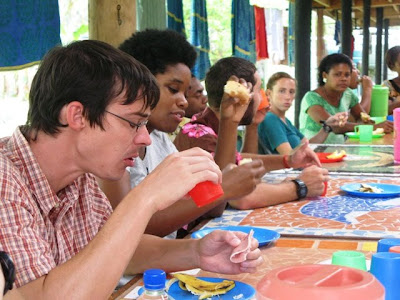
Lunch
Tonight I went to The Pearl again, dragging the Fijian boys with us. They enjoyed their time playing pool and eventually left to visit a nearby village and drink grog. Oh well, we are different cultures with different desires. They stayed out until 2 and 4 in the morning! Wow.
Friday, January 22, 2010
Wrapping up training. We discussed problem solving and resources available to youth. It was a pretty short day with a another message from the country director and certificates of completion handed out at the end.
For dinner we had a barbeque and I helped several of the Fijian boys ‘man the grill’.

At sunset I headed to the beach to enjoy the views, which is when the pictures below were taken.
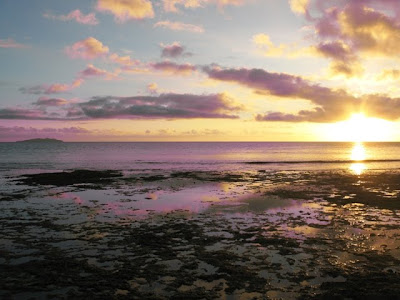

After dinner I headed to The Uprising with the FRE-07s and had a great time hanging out with my Vanua Levu friends that I had not seen in several months. Good times!
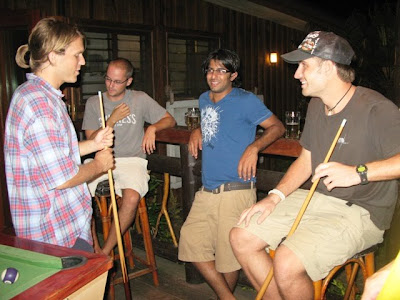
Saturday, January 23, 2010
Time to head back to the village. I am not excited about going back… I guess because the holidays in the village were so stressful that I expect it to be the same way when I arrive.
So I left the Coral Coast around 8 AM, bus to Suva, bought some groceries, then the bus towards Rakiraki. While I was sitting on the bus a young man attending the South Pacific Bible College sat next to me. He was about my age so I started the conversation by the typical question “Where are you going”. It turns out his mother had Ciguatera poisoning and he was going to visit her. She was doing well and was going to survive, no doubt, but he wanted to visit her. Then, we got into the topic of religion. He was telling me about this professor named Charlie that was a “scientist” who preached about why science is never fact and that the Carbon 2 dating we have been using has proven to be false. He was saying something about a new Carbon 3 dating method that has proven many bones, stones, etc. dated tens of thousands of years old are now turning out to be about 1000 years old. I have not read this yet in any newspaper or National Geographic, so I am not so sure where his professor is getting this information. Who knows, it is next to impossible to believe strongly in science and religion. It is almost as if you must pick what is convenient for you to believe in. You could say that evolution really occurs, but that God meant for it to happen, but then where does Adam and Eve come in? Also, what about the hundreds of religions that came before Christianity or even monotheism? Are all of the people before the year of Christ wrong about their deity/deities and went to hell… for 250,000 years? Why would a loving and just God decide to save 2,000 years worth of people and not the 250,000 or so years before? Why does he kill thousands of people in the Bible if “Thou shall not murder” is one of the Ten Commandments? Why does he allow so many people to have many wives if “Thou shall not commit adultery”? I take a quote from Thomas Jefferson himself “I am satisfied, and sufficiently occupied with the things which are, without tormenting or troubling myself about those which may indeed be, but of which I have no evidence.” Also, as Richard Dawkins puts it in his book The God Delusion “Any creative intelligence, of sufficient complexity to design anything, comes into existence only as the end product of an extended process of gradual evolution. Creative intelligences, being evolved, necessarily arrive late in the universe, and therefore cannot be responsible for designing it”. I am not trying to preach to anyone, or question anyone’s religious beliefs, I just have many unanswered questions that leave me staggering in the dark. For now, I will believe in Darwinism until some miracle changes my theory.
When I arrived at the boat dock all of the Ra Peace Corps volunteers were there because they had just swam across Viti Levu Bay and had a picnic on the beach! How cool is that. Hopefully I will not miss out the next time they organize it. There were about 10 of us sitting on the beach waiting for a bus, the tide, or their ice cream to melt off the stick.

Eventually all waiting ceased and Lydia and I boarded our boat home. On the boat ride Lydia and I had a heart-to-heart and she said she was proud of me for how I have opened up to the culture since arriving in Fiji. I have noticed lots of changes in myself lately and all for the better! Peace Corps’ website and Peace Corps volunteers’ blogs were right when they said you will learn new things about yourself during the two years that you otherwise may not have ever learned.

View coming up to my village on the boat.
Back in the village I was welcomed home with open arms. Everyone seemed excited to have me back and life became normal and productive again. As soon as I sat down I got started on my trimester report for Peace Corps. I did not get one for the first three months of service so I am about six months behind. The more time I spend on it the more thorough it will be.
Sunday, January 24, 2010
They did not drink yaqona last night for the first time since before Christmas. It was so relaxing to go to people’s houses last night and visit without the smoke and yaqona bowl! I am hoping that the last several weeks were the way they were because of the holidays!
Nothing today but trimester report, reading, napping, cooking, and entertaining guests.
Monday, January 25, 2010
The bugs are awful! I came back from the Coral Coast covered in red mosquito bites and they are still itching, plus flies and no-see-ums everywhere. Oh the hot, wet season. The rain has helped my garden though! My basil plants are about two feet tall and I have cucumber, tomatoes, and long beans growing! It is fun to eat what you grow!
Today I sunned my mats, washed dishes and door mats, pulled an ample amount of weeds, and tried to get my bathroom drain unclogged. No success. We were supposed to have that meeting of the year (bose va koro) today, and again, it was not announced, so no meeting. I am getting frustrated because I cannot help or do my work without the enthusiasm or organization of committees. I need to reorganize the kindergarten committee and youth group as well as start a footpath committee. These things are being put off for weeks at a time because the village meeting has not been happening.






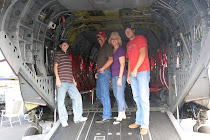



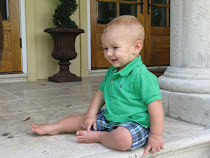







No comments:
Post a Comment